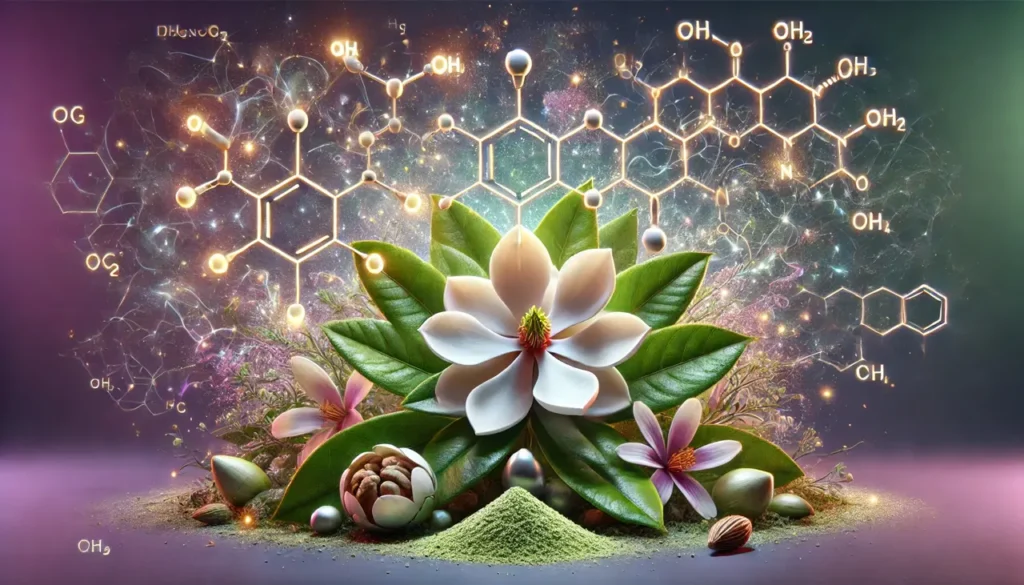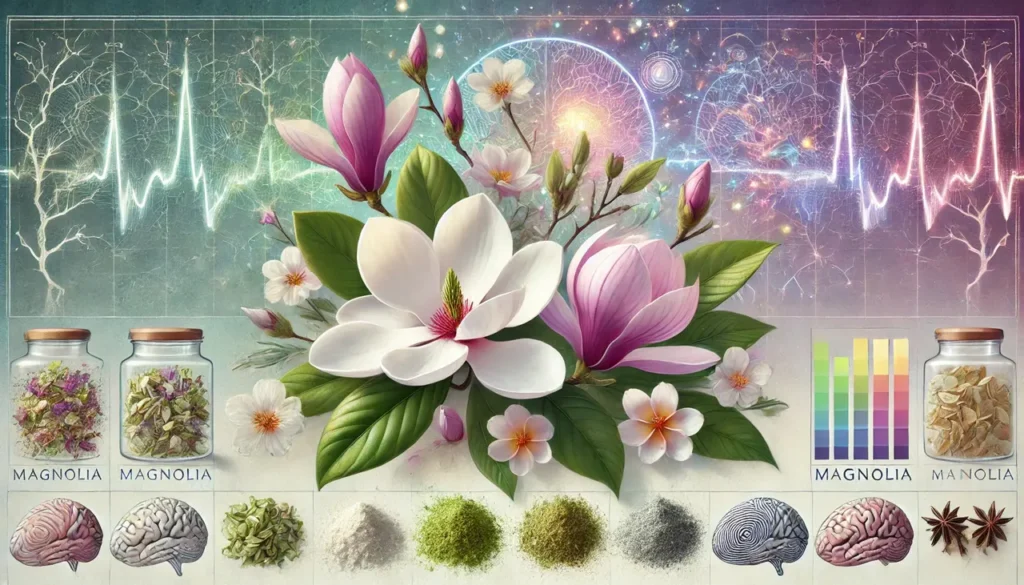Magnolia, derived from the bark of the Magnolia tree, has been used for centuries in traditional Chinese medicine and other holistic health practices due to its potential health benefits. Recently, its use as a nootropic—an agent that may enhance cognitive function—has gained attention. Known for its calming and anxiolytic properties, Magnolia contains active compounds that are thought to influence brain health, providing potential benefits such as reducing anxiety and improving focus. This article explores the chemistry, physiological mechanisms, nootropic benefits, dosage guidelines, potential side effects, interactions with other substances, and safety considerations for those considering Magnolia as a nootropic supplement.
You May Also Like:
Sources of Magnolia
Magnolia, specifically Magnolia officinalis, is a flowering plant found in parts of East Asia and North America. The primary part of the plant used for supplementation is the bark, which contains bioactive compounds believed to contribute to its medicinal effects. Two major compounds in Magnolia bark—honokiol and magnolol—are thought to play significant roles in its pharmacological properties. Magnolia supplements are typically available in the form of standardized extracts, where these compounds are concentrated for maximum therapeutic effects.
Promote Calmness and Improve Cognitive Function with Magnolia Extract—Shop Today on Amazon!

Chemistry of Magnolia
The primary bioactive components of Magnolia bark are honokiol and magnolol, both of which belong to a class of compounds known as lignans. These compounds are structurally similar to flavonoids, but they possess a distinctive chemical structure that allows them to interact with various neurotransmitter systems in the body, influencing both mood and cognition.
- Honokiol: This is a biphenyl compound that has been extensively studied for its potential neuroprotective properties. Honokiol acts on multiple biological pathways, including GABA (gamma-aminobutyric acid) receptor modulation, where it enhances GABAergic transmission. This interaction has calming effects on the nervous system, promoting relaxation and reducing stress, which may indirectly support cognitive performance by reducing anxiety and mental fatigue.
- Magnolol: Like honokiol, magnolol is a biphenyl compound but has a slightly different chemical structure. Magnolol has been shown to exhibit antioxidant and anti-inflammatory properties. In the brain, magnolol’s actions may help protect against neuroinflammation, a key factor in cognitive decline and neurodegenerative diseases.
Both honokiol and magnolol possess neuroprotective and calming properties that contribute to the overall effectiveness of Magnolia as a nootropic supplement.

Physiological Mechanisms of Magnolia in the Body and Brain
Magnolia’s action on the body and brain is multifaceted, with the primary effects being anxiolytic (anxiety-reducing) and neuroprotective. The following mechanisms illustrate how these compounds work:
- GABA Receptor Modulation: Honokiol enhances the activity of GABA receptors, which are the primary inhibitory neurotransmitters in the brain. This leads to a calming effect, reducing feelings of stress and anxiety. By decreasing the levels of excitatory neurotransmitters, Magnolia may help balance the brain’s activity, promoting a state of calm and relaxation that may enhance focus and cognitive function.
- Neuroprotection and Antioxidant Activity: Both honokiol and magnolol possess potent antioxidant properties. They scavenge free radicals and reduce oxidative stress in the brain, which is critical for long-term cognitive health. Chronic oxidative damage to neural cells is linked to cognitive decline and neurodegenerative diseases like Alzheimer’s and Parkinson’s. Magnolia’s ability to mitigate this damage may help preserve cognitive function over time.
- Anti-Inflammatory Effects: Inflammation in the brain is another factor contributing to cognitive decline. Magnolia’s compounds, particularly magnolol, have anti-inflammatory effects that may help prevent or mitigate neuroinflammation, promoting better brain health and function. This is crucial for maintaining sharp mental performance and could aid in the prevention of conditions such as Alzheimer’s disease.
- Stress Reduction and Cognitive Clarity: By lowering cortisol (the stress hormone) levels and acting on the GABAergic system, Magnolia may help reduce mental fatigue caused by stress. This contributes to clearer thinking, better memory, and enhanced cognitive clarity. With reduced stress, the brain can function more efficiently, improving focus and mental performance.
Support Emotional Balance and Improve Brain Performance with Magnolia Extract—Buy Today on Amazon!

Nootropic Benefits of Magnolia
Given its unique chemical composition and neuroprotective properties, Magnolia has been increasingly recognized as a potential nootropic supplement. Its benefits extend beyond stress relief and include cognitive enhancement and mood regulation:
- Anxiety Reduction: Magnolia is perhaps most well-known for its calming effects. By enhancing GABAergic activity, it can significantly reduce anxiety and stress levels, creating a more conducive environment for cognitive performance. This makes it a popular choice for individuals looking to enhance mental clarity while managing stress, particularly in high-pressure situations like exams or work deadlines.
- Cognitive Enhancement: Although research on Magnolia specifically as a cognitive enhancer is still developing, its neuroprotective properties suggest that it may help support long-term brain health. By reducing oxidative stress and inflammation, Magnolia helps preserve neuronal integrity, which is crucial for maintaining cognitive function over time. This may make it beneficial for those seeking to maintain sharpness and clarity into older age.
- Memory Improvement: Preliminary studies suggest that Magnolia may support memory function. One study showed that honokiol improved spatial learning and memory in animal models, potentially indicating its usefulness in supporting memory retention and recall. Further research in humans is necessary to confirm these effects, but the antioxidant and anti-inflammatory actions of Magnolia could support memory health.
- Mood Regulation: By acting on the GABA system, Magnolia helps to balance mood and reduce feelings of anxiety and depression. Mood stabilization is crucial for maintaining cognitive clarity, as mood disturbances often impair focus and productivity. Magnolia’s ability to promote calmness and alleviate anxiety could improve mental well-being, indirectly supporting better cognitive function.

Dosage and Supplementation Guidelines
When it comes to Magnolia supplementation, it is important to adhere to recommended dosages to avoid potential side effects. While individual needs may vary, the following general guidelines are commonly suggested:
- Standard Dosage: A typical Magnolia extract dosage ranges from 100 to 500 mg per day, usually taken in divided doses. Some studies have used doses as high as 800 mg per day, particularly for anxiety and stress reduction. For cognitive enhancement, lower doses of around 200 mg per day are often sufficient.
- Therapeutic Dosage: For therapeutic use, such as for anxiety or insomnia, higher doses may be considered. However, it is crucial to start with a lower dose and gradually increase it as needed, under the supervision of a healthcare provider. Dosages can be adjusted based on individual responses to the supplement.
- Supplement Forms: Magnolia is available in various forms, including capsules, tablets, and tinctures. The most commonly used form is a standardized extract, which contains concentrated amounts of honokiol and magnolol for maximum therapeutic benefits. It is advisable to choose a product that specifies the percentage of active compounds to ensure consistent dosage.
Support Stress Management and Boost Cognitive Agility with Magnolia—Shop Today on Amazon!

Side Effects and Safety
Magnolia is generally considered safe for most people when used at appropriate dosages. However, as with any supplement, there are some potential side effects and safety considerations to keep in mind:
- Sedation: Due to its calming effects, Magnolia may cause drowsiness or sedation in some individuals, especially when taken in higher doses. This may be desirable for those seeking sleep aid or stress relief, but it could be problematic for individuals who need to maintain alertness during the day.
- Digestive Issues: Some individuals may experience mild digestive discomfort, such as nausea or an upset stomach, particularly when taking Magnolia on an empty stomach. It is recommended to take Magnolia with food to minimize this risk.
- Allergic Reactions: Although rare, allergic reactions to Magnolia can occur. Symptoms may include rashes, itching, or swelling. Anyone experiencing these symptoms should discontinue use and consult a healthcare provider.
- Interaction with Medications: Magnolia may interact with certain medications, particularly those that affect the central nervous system (CNS), such as sedatives, anti-anxiety drugs, and antidepressants. Magnolia’s calming effects could potentially enhance the sedative effects of these medications, leading to excessive drowsiness or other complications. Individuals taking prescription medications should consult a healthcare provider before using Magnolia supplements.
Interactions with Other Supplements and Medications
Magnolia may interact with other supplements and medications, particularly those that influence brain activity. Notable interactions include:
- Sedatives and Anti-anxiety Medications: Magnolia may have additive effects when taken with other CNS depressants. Combining it with medications like benzodiazepines, sleep aids, or certain antidepressants could increase the risk of drowsiness, dizziness, or difficulty concentrating.
- Caffeine: Magnolia’s calming effects may be counteracted when taken with stimulants like caffeine. Those who consume high doses of caffeine should monitor their Magnolia intake to avoid potential interactions.
- Other Nootropics: Magnolia can be combined with other nootropic supplements to enhance cognitive function. However, individuals using racetams or cholinergic nootropics should be cautious, as combining them with Magnolia may lead to overstimulation or excessive sedation.
Risks for Individuals with Certain Health Conditions
Certain individuals should use caution when considering Magnolia supplementation:
- Pregnancy and Breastfeeding: Magnolia should be avoided during pregnancy and breastfeeding due to limited safety data. Pregnant or breastfeeding women should consult a healthcare provider before using Magnolia.
- Liver or Kidney Issues: People with liver or kidney disease should consult a healthcare provider before using Magnolia supplements. As Magnolia’s compounds are metabolized in the liver, those with compromised liver function may be at risk of accumulation.
Boost Relaxation and Enhance Brain Function with Magnolia Extract—Order Today on Amazon!

Conclusion: Should You Consider Magnolia as a Nootropic?
Magnolia shows promise as a nootropic supplement, with its potential to enhance cognitive function, reduce stress, and improve mood. Its active compounds, honokiol and magnolol, offer neuroprotective and anti-inflammatory properties that may support long-term brain health. While more research is needed to confirm its cognitive-enhancing effects in humans, current evidence suggests that Magnolia may be a valuable option for individuals seeking to reduce stress, improve focus, and protect against age-related cognitive decline.
As with any supplement, it is crucial to consult with a healthcare provider before adding Magnolia to your routine, particularly if you are pregnant, breastfeeding, or taking other medications. By following recommended dosage guidelines and monitoring for side effects, Magnolia may provide cognitive and mood-enhancing benefits for those looking to optimize their brain health.

References:
- Therapeutic applications of compounds in the Magnolia family . Retrieved from: https://pubmed.ncbi.nlm.nih.gov/21277893/
- Biological activity and toxicity of the Chinese herb Magnolia officinalis Rehder & E. Wilson (Houpo) and its constituents. Retrieved from: https://pubmed.ncbi.nlm.nih.gov/28271656/
- Effect of a proprietary Magnolia and Phellodendron extract on stress levels in healthy women: a pilot, double-blind, placebo-controlled clinical trial. Retrieved from: https://pubmed.ncbi.nlm.nih.gov/18426577/
- Magnolia officinalis – Purported Benefits, Side Effects & More. Retrieved from: https://www.mskcc.org/cancer-care/integrative-medicine/herbs/magnolia-officinalis
Important Note: The information contained in this article is for general informational purposes only, and should not be construed as health or medical advice, nor is it intended to diagnose, prevent, treat, or cure any disease or health condition. Before embarking on any diet, fitness regimen, or program of nutritional supplementation, it is advisable to consult your healthcare professional in order to determine its safety and probable efficacy in terms of your individual state of health.
Regarding Nutritional Supplements Or Other Non-Prescription Health Products: If any nutritional supplements or other non-prescription health products are mentioned in the foregoing article, any claims or statements made about them have not been evaluated by the U.S. Food and Drug Administration, and such nutritional supplements or other health products are not intended to diagnose, treat, cure, or prevent any disease.


